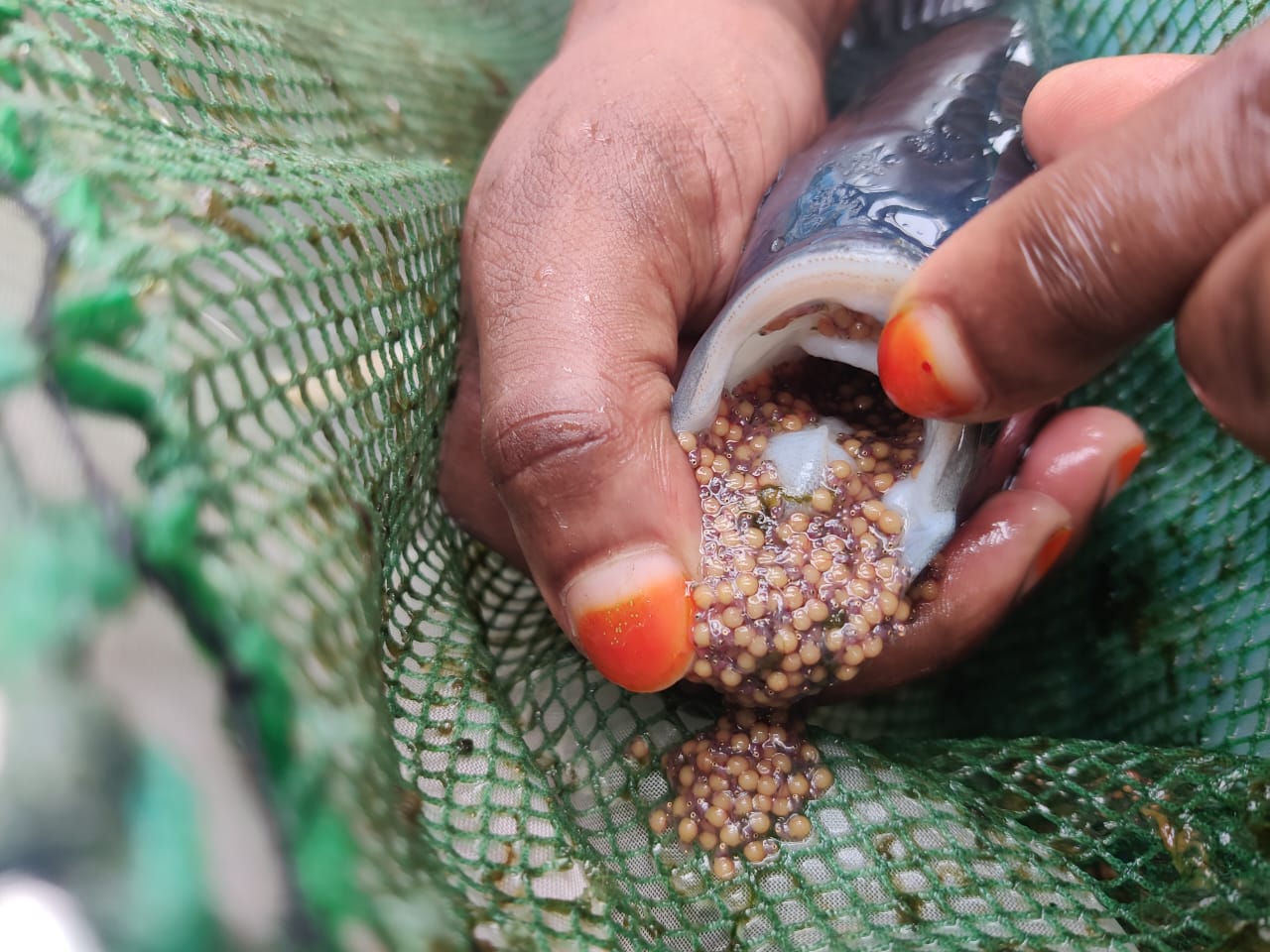TAAT facilitates Capacity Building for Fish Farmers in Rwanda
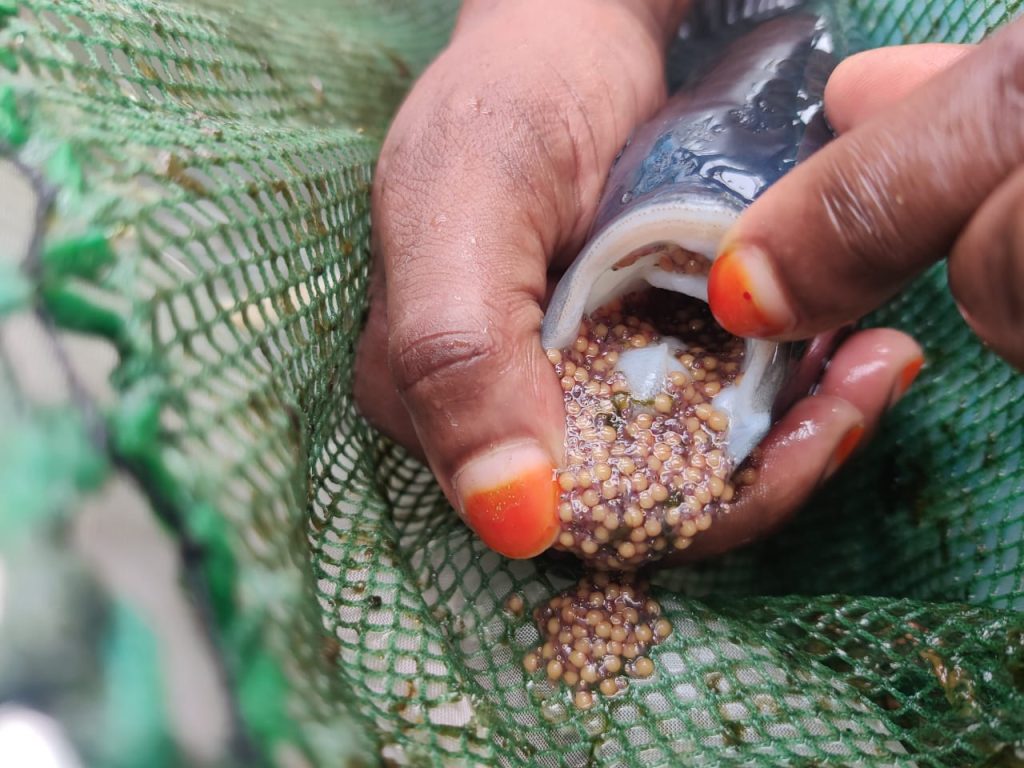
Technologies for African Agricultural Transformation (TAAT) has held a capacity-building workshop for Fish hatchery owners in Rwanda. The workshop, which held from the 7th to the 22nd of March 2023 in Kigali, the Rwandan capital, facilitated the validation of Fish Hatcheries Standard Operating Procedures (SOPs) to guide upcoming certification efforts to improve fish seed.
The Rwanda Ministry of Agriculture and Animal Resources (MINAGRI), the Rwanda Agriculture and Animal Resource Development Board (RAB) and the USAID Feed the Future Orora Wihaze (Raise Animal for Self-Sufficiency) Project collaborated with TAAT to achieve the overall objective of training fish hatchery operators and validating the SOPs in Rwanda.
The workshop was facilitated by experts drawn from TAAT, the WorldFish Centre, USAID Feed the Future Orora Wihaze, MINAGRI and RAB. These include Dr Charles Murekezi, Prof Bernadette Fregene, Dr Trong Trinh, Mr Jean Claude Ndorimana, Mathilde Mukasekuru, and Cecile Uwizeyimana. Others are Lucia Zigira, Wilson Rutaganira, Dennis Karamuzi, and Hortence Baho.
The workshop began with a review of the draft documents, i.e., the SOPs, guidelines/manual, and checklist) as presented by Dr Trinh and Prof Fregene. Dr Trinh remarked that good hatchery practice is vital for better survival, growth rate, and increased fish production from the same tilapia strains. At the same time, selective breeding programs improve the quality of fish seeds. This was followed by discussions by the participants from the private sector (hatcheries and farms) and the government’s (MINAGRI and RAB) perspectives on the contents of the documents. Taking inspiration from successful models in countries like China, Vietnam, Thailand, and Norway, the workshop identified ten certified fish hatcheries to ensure the supply of high-quality fish seed to farmers. This collaborative approach aims to support the growth and sustainability of the fish farming industry in Rwanda.
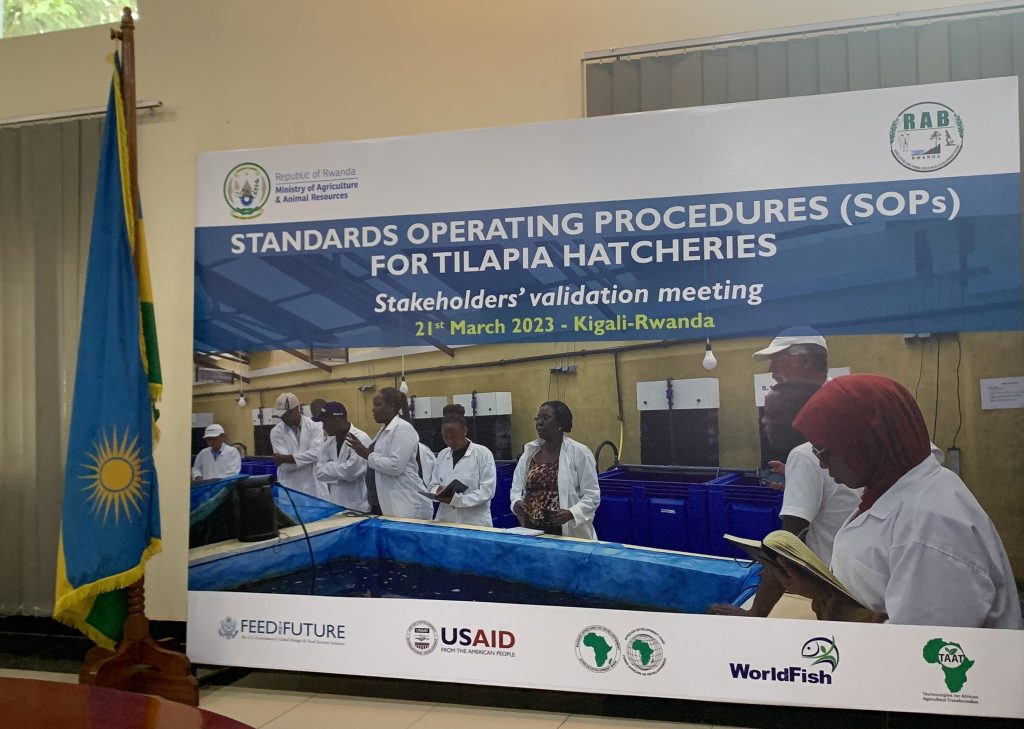
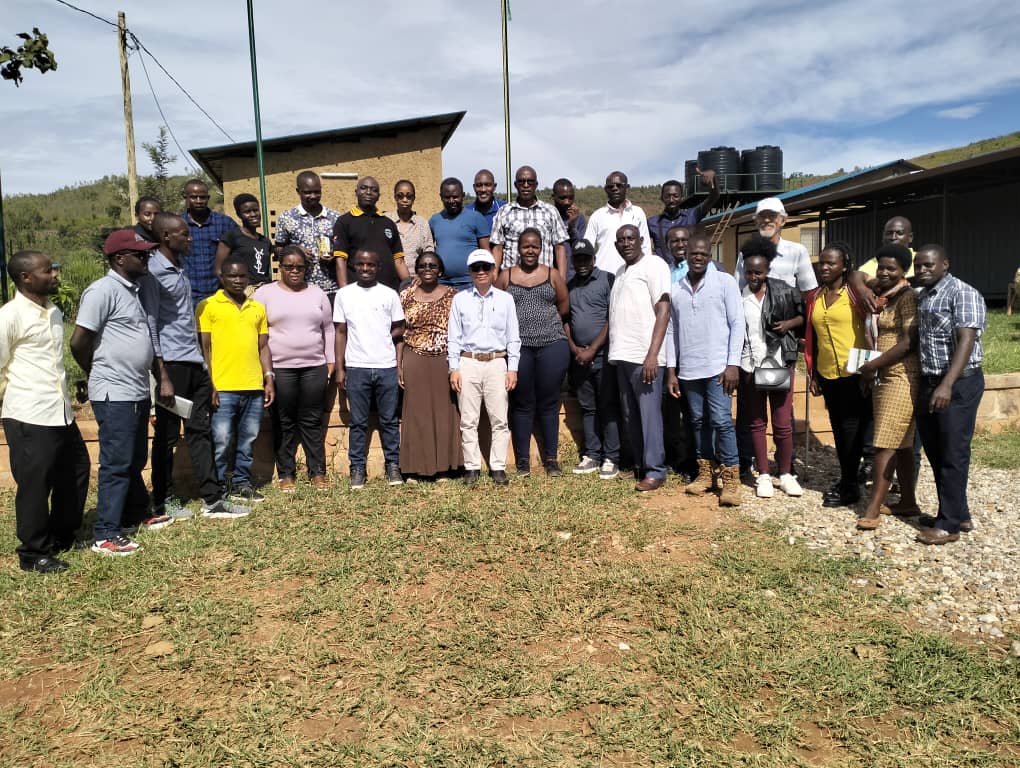
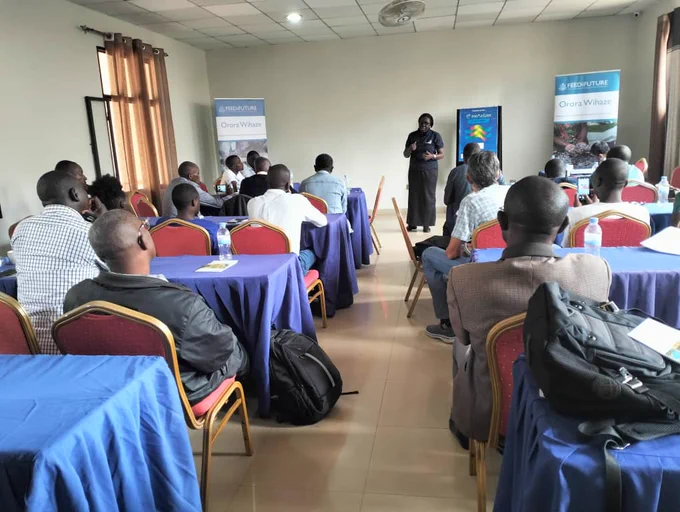
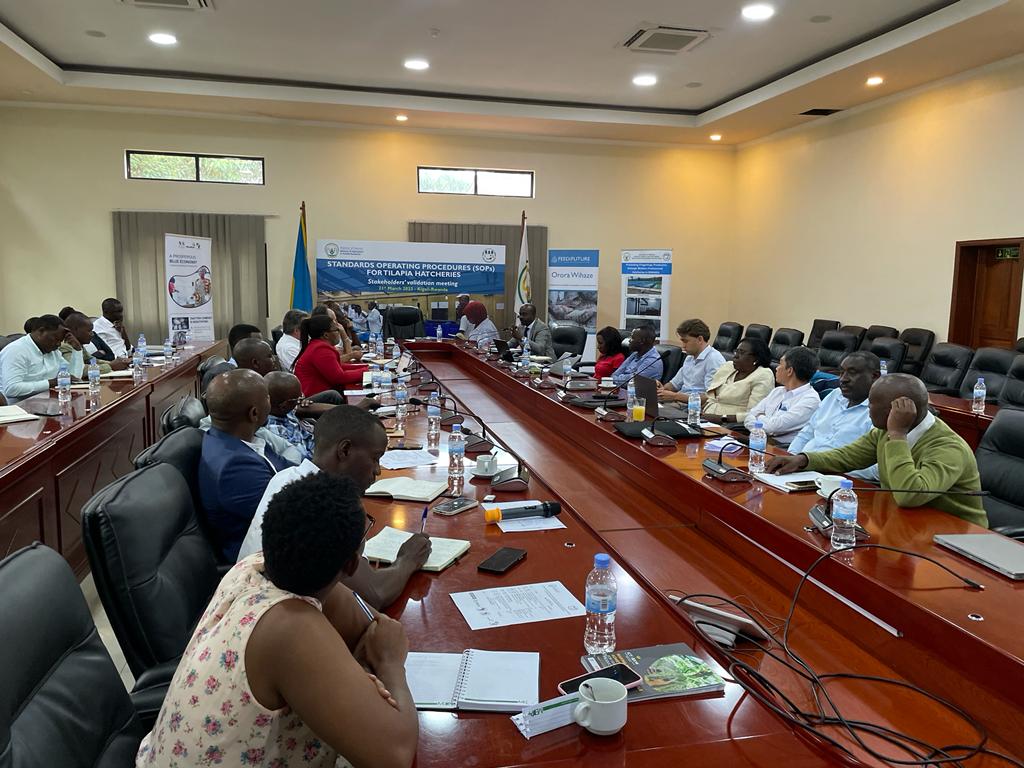
The participants were taken to selected tilapia hatcheries to update and confirm the relevance of the SOPs to the tilapia hatchery operations. The hatcheries include Dufatanye Cooperative, Kivu Choice Tilapia Hatchery, Fine Fish, and Fresh Fish (FreFish)
During the visit, they identified some challenges associated with hatchery supplies—particularly the high cost and scarcity of the sex reversal hormone and the expensive nature of aquaculture inputs. Specific facilities and biosecurity measures in a standard hatchery were also emphasized to ensure efficient operations and prevent disease outbreaks.
A three-day hands-on training for 34 participants drawn from MINAGRI, RAB, and hatchery operators of 16 tilapia hatcheries equally took place in both theoretical and practical format. The participants included professionals and technicians from various hatcheries, research fellows, program coordinators, and legal and administrative staff. This diverse group represents a range of expertise and experience in aquaculture, specifically tilapia hatchery operations.
Some of the thematic areas covered include various aspects of the SOPs, site selection, water quality, facilities of a typical tilapia hatchery, feed and feeding, Broodstock management, and procedures for tilapia fry/fingerlings production. The training provided valuable technical information on tilapia hatchery and husbandry technologies, which many participants appreciated.
The second part of the training comprised practical sessions on the SOPs in three hatcheries. This brought forth an opportunity to highlight the importance of practical evaluation and comparison of SOPs with current hatchery practices, providing participants with a valuable opportunity to apply their knowledge, identify areas of improvement, and strengthen the connection between theory and practice in tilapia hatchery operations.
To conclude the week-long workshop, a stakeholder SOP Validation Workshop occurred on 21 March 2023. To further streamline and harmonize the recommendations in the SOPS, the participants were organized into groups to provide feedback on the contents.
The discussions resulted in verification, improvements, and recommendations that will enhance the effectiveness and relevance of the SOPs for tilapia hatchery operations. Some of the additions were details on the treatment of dead fish, the position of hatcheries relative to the market, the checking of wild fish before use, the monitoring during the quarantine period, and essential disease treatment.
These were received by the WorldFish Scientists and added to the final revision of the SOPs. At the end of the Validation Workshop, the SOPs were announced to be validated by Mr Jean Claude Ndorimana, Director General of Animal Resources Development, Rwanda.
In closing, Dr Solange Uwituze, RAB’s Director General recalled her request to TAAT before the onset of COVID-19 and appreciated TAAT Clearinghouse for delivering technical assistance in the areas of developing SOPs for tilapia, catfish, and training hatchery operation managers.
Dr Uwituze insisted that compliance with standards is paramount and that the Rwandan government will certify hatcheries. She thanked the partners, including TAAT, Land O’Lakes, and ENABEL, who have been instrumental in this endeavour. She added that Aquaculture presently contributes 10% of 43,000 MT/year, and 90% is from capture fisheries, and the government plans to make aquaculture the principal actor.
The collaboration between TAAT, MINAGRI, RAB, Orora Wihaze, and the Hatchery Private Sector is significant in Rwanda’s quest for aquaculture development. Through TAAT’s technical assistance, the professionalization of fisheries hatcheries, validation of SOPs, and capacity building of aquaculture value chain actors was achieved. With TAAT’s expertise and all stakeholders’ commitment, Rwanda’s aquaculture sector is poised to grow substantially, contributing to the nation’s agricultural transformation and food security objectives.


